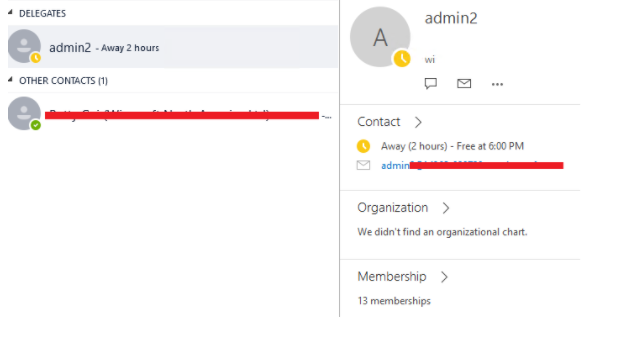Topics Map > Communication and Collaboration > Lync / Skype for Business
- Delete Cache Skype For Business
- Delete Cache Skype For Business Meeting
- Delete Skype For Business Cache Windows 10
- Delete Cache Skype For Business Email

This page describes how to clear Windows Credential Manager to remove stored Skype for Business login credentials
Select File: EndpointConfiguratation.cache and delete it. Launch Skype for Business client and sign in. When you have a older version of Office running change the 16.0 to 15.0 or 14.0.
- Manually add Skype for Business server settings: Go to Skype for Business options Personal. Under My account, select Advanced, and then select Manual configuration. Enter sipdir.online.lync.com:443 in both boxes, and then select OK OK. Sign out, and then try signing back in.
- Click ‘Delete All’ to confirm and finish Skype chat history deletion Steps to Secure Erase Skype Conversation and Call History Clearing chat history in Windows 10 or Mac only removes access to the data, but it does not wipe your sensitive chat and call history data from the disk.
- I'm assuming this is a current version of Windows 10 and a current version of Skype DESKTOP. If so, history should continue to work, add new messages, and show all past messages as well: I've just tested the following: Skype DESKTOP, (NOT the universal or web version): Version 7.40.0.151 Windows 'Creator's Edition': W-10 v-1709 Build 16299.248.
Delete Cache Skype For Business
Windows Credential Manager is a service on Windows 7, 8, and 10 that stores login credentials to allow Skype for Business and other services to login automatically at start up. This can sometimes cause problems logging in, one of the first steps in troubleshooting failed logins in Windows should be removing those stored credentials from the vault.
- To do that you first need to make sure you have fully exited the Skype for Business client.
- Then go to the Start menu and find the control panel (settings). In the control panel search for Credential Manager and open it.
- Under Windows Credentials > Generic Credentials, there should be an entry that starts 'Microsoft_OC1:uri=' and 'MicrosoftOffice16...'
- These are the stored Skype for Business credentials.
- Click the downward arrow to expand the credential and then at the bottom of the credential select Remove.
| Keywords: | Lync, stored, cached, password, credential manager, windows, Skype for Business, sfb, s4b, clear loginSuggest keywords | Doc ID: | 34179 |
|---|---|---|---|
| Owner: | Lync M. | Group: | University of Illinois Technology Services |
| Created: | 2013-10-04 13:27 CDT | Updated: | 2021-02-16 10:30 CDT |
| Sites: | University of Illinois Technology Services | ||
| Feedback: | 3431CommentSuggest a new documentSubscribe to changes | ||
Over time, your Skype’s Contact section will probably get cluttered with hundreds of business and personal contacts. It may soon consist of people who you haven’t talked to in years or even those who have removed you as a contact on their end. Either way, you may have to clean up your Contact List eventually. Here are the steps on how to delete Skype contacts:

Delete Skype Contacts
Simply go to your Contact list and find the name of the contact you want to delete. Right-click the name and click on the ‘Remove from Contacts’ option. Confirm the removal.
Note that a removed contact will still appear on your Recent tab, although it will have question mark to indicate it’s removal from your directory. However, the said contact can still call or message you. Now if you really want to prevent someone from contacting you altogether, you have to choose the Block This Person option.
Delete Facebook Contacts
Upon signing up for Skype, it will present the option to merge your Contacts with your Facebook account, which essentially means all your Facebook friends will appear on your Skype contact list. While this may seem cool at first, the time may come when you wish to separate both applications.
Currently, there are no means to delete FB contacts within Skype. What you can do, however, is to Disconnect from Facebook. Here’s how to do this:
- Go to View
- Click Skype Home
- Click the blue-colored ‘gear’ button on the right
- Select Disconnect from Facebook
Delete Cache Skype For Business Meeting
Another course of action, although rather drastic, is to unfriend the said contact in Facebook – he or she will disappear from your Skype contact list as well.
Delete MSN Contacts
Skype also offers a feature that allows you to merge your MSN contacts with your existing Skype Contact List. Unfortunately, there is currently no way to delete MSN contacts that have migrated to your Skype (you’ll find the Delete and Block option grayed out).
Delete Skype For Business Cache Windows 10
For sure though, Skype is already working on this and we should expect changes on the next update.
As for important calls from certain contacts, you might want to use a Supertintin’s Skype video recorder to ensure you can get back to your conversations whenever you want to.
Delete Cache Skype For Business Email
You may also like ...